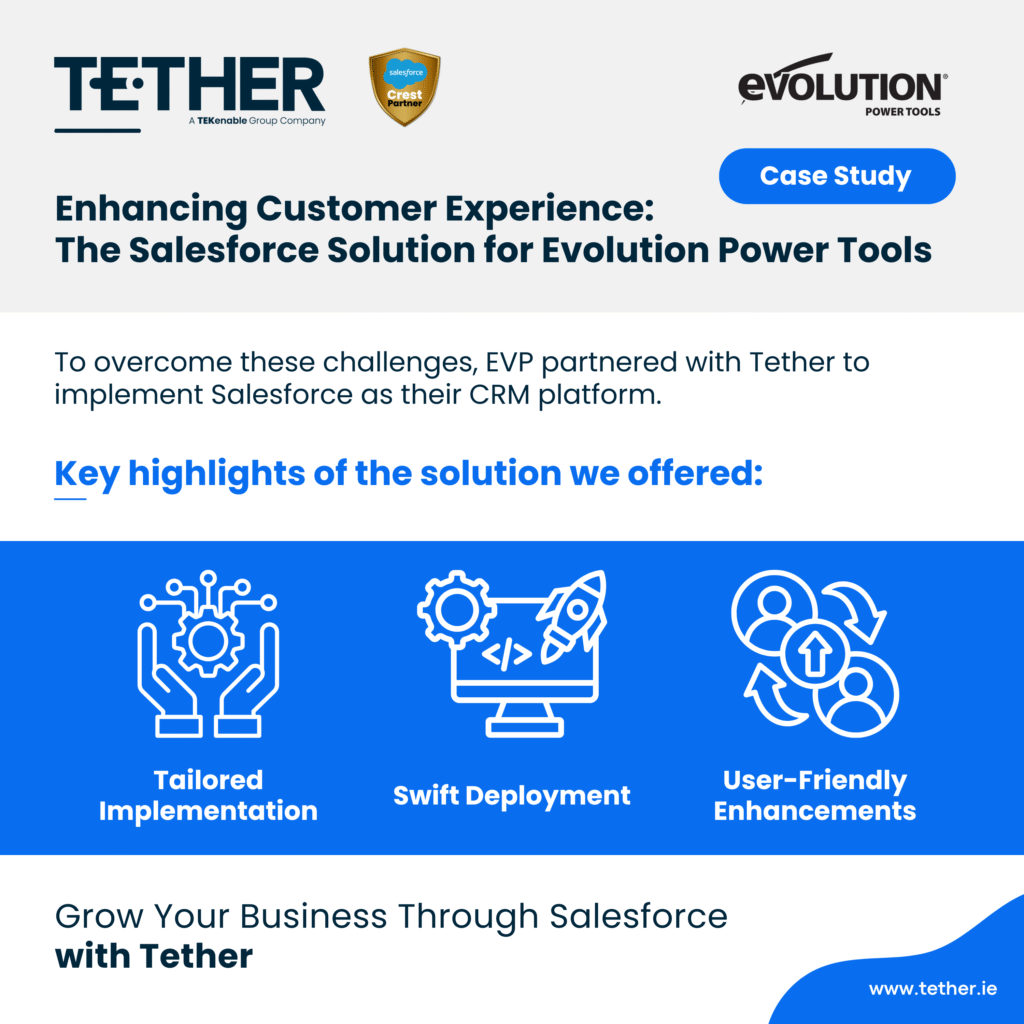
The Challenge
Evolution Power Tools (EVP), a company with roots in B2B sales since the 1990s, faced critical challenges when expanding into Direct-to-Consumer (DTC) markets in 2020:
- Scalability and Resource Constraints: Limited resources to develop and maintain an in-house CRM system.
- Centralised Customer Data: A need for a unified system to manage communications, track customer demand, and interactions.
- User Adoption: Struggles with onboarding employees, particularly those less familiar with technology.
Salesforce CRM Solution
To overcome these challenges, EVP partnered with Tether to implement Salesforce as their CRM platform. Key highlights of the solution include:
- Tailored Implementation: On-site visits to understand EVP’s unique business needs and expert consultants offering insights and alternative approaches for customisation.
- Swift Deployment: Rapid go-live in both the US and UK markets and comprehensive planning ensured smooth adoption.
- User-Friendly Enhancements: Streamlined workflows, including macros and reduced clicks for repetitive tasks and ongoing support to address adoption hurdles.
The Outcome
Salesforce delivered significant benefits to EVP, enabling them to achieve their goals and position themselves for future growth:
- Centralised Customer Data: Improved tracking of customer demand and reasons for contact and enhanced customer experience through better data management.
- Operational Efficiency: Simplified processes for employees, boosting productivity.
- Continuous Improvement: Regular updates and new projects every 18 months to enhance functionality.
- Future Readiness: Expansion into new markets and improved self-service options for customers as well as integration of AI tools for language support.

Salesforce CRM Solution FAQ’s:
1. What is Salesforce CRM and what are its benefits?
Salesforce CRM is a cloud-based platform that helps businesses manage customer relationships, sales, marketing, and service operations. Its benefits include improved customer engagement, streamlined workflows, real-time analytics, and scalability for growing businesses.
2. Which departments typically use Salesforce CRM?
Salesforce is widely used across departments such as sales, marketing, customer service, finance and operations. Each team leverages its tools for lead tracking, campaign management, customer support and performance reporting.
3. How does Salesforce ensure data quality and accuracy?
Salesforce offers features like validation rules, duplicate management, automated workflows, and audit trails to maintain clean and accurate data. Regular data hygiene practices and user training also play a key role.
4. What are common challenges when using Salesforce CRM?
Some common challenges include user adoption, system customisation complexity, and data migration. These can be addressed through proper onboarding, working with certified consultants, and phased implementation strategies.
5. What integrations are available with Salesforce CRM?
Salesforce integrates with a wide range of tools including email platforms (like Outlook and Gmail), marketing automation (like Mailchimp and Hubspot), ERP systems, e-commerce platforms, and collaboration tools like Slack.
6. Do I need a Salesforce implementation partner?
While Salesforce can be configured in-house, many businesses benefit from working with certified implementation partners. They bring expertise in tailoring the platform to specific business needs and ensuring a smooth rollout.



